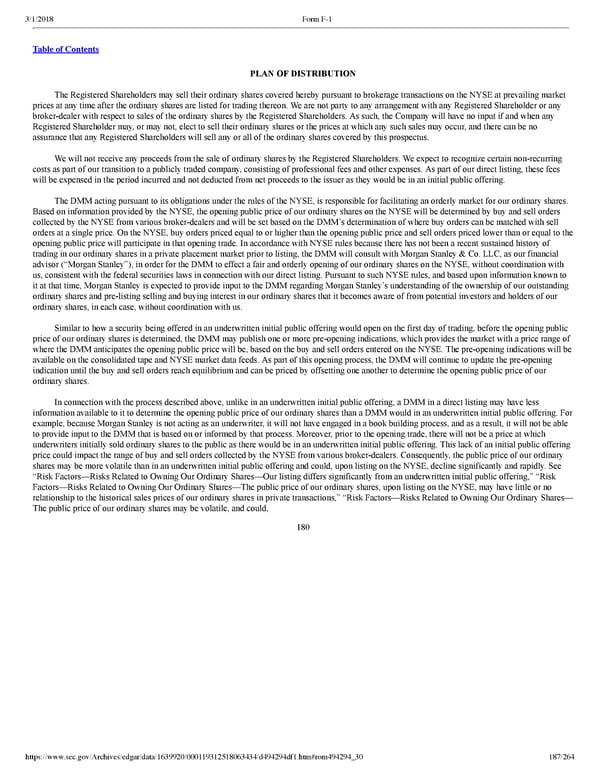187/264 PLAN OF DISTRIBUTION The Registered Shareholders may sell their ordinary shares covered hereby pursuant to brokerage transactions on the NYSE at prevailing market prices at any time after the ordinary shares are listed for trading thereon. We are not party to any arrangement with any Registered Shareholder or any brokerdealer with respect to sales of the ordinary shares by the Registered Shareholders. As such, the Company will have no input if and when any Registered Shareholder may, or may not, elect to sell their ordinary shares or the prices at which any such sales may occur, and there can be no assurance that any Registered Shareholders will sell any or all of the ordinary shares covered by this prospectus. We will not receive any proceeds from the sale of ordinary shares by the Registered Shareholders. We expect to recognize certain nonrecurring costs as part of our transition to a publicly traded company, consisting of professional fees and other expenses. As part of our direct listing, these fees will be expensed in the period incurred and not deducted from net proceeds to the issuer as they would be in an initial public offering. The DMM acting pursuant to its obligations under the rules of the NYSE, is responsible for facilitating an orderly market for our ordinary shares. Based on information provided by the NYSE, the opening public price of our ordinary shares on the NYSE will be determined by buy and sell orders collected by the NYSE from various brokerdealers and will be set based on the DMM’s determination of where buy orders can be matched with sell orders at a single price. On the NYSE, buy orders priced equal to or higher than the opening public price and sell orders priced lower than or equal to the opening public price will participate in that opening trade. In accordance with NYSE rules because there has not been a recent sustained history of trading in our ordinary shares in a private placement market prior to listing, the DMM will consult with Morgan Stanley & Co. LLC, as our financial advisor (“Morgan Stanley”), in order for the DMM to effect a fair and orderly opening of our ordinary shares on the NYSE, without coordination with us, consistent with the federal securities laws in connection with our direct listing. Pursuant to such NYSE rules, and based upon information known to it at that time, Morgan Stanley is expected to provide input to the DMM regarding Morgan Stanley’s understanding of the ownership of our outstanding ordinary shares and prelisting selling and buying interest in our ordinary shares that it becomes aware of from potential investors and holders of our ordinary shares, in each case, without coordination with us. Similar to how a security being offered in an underwritten initial public offering would open on the first day of trading, before the opening public price of our ordinary shares is determined, the DMM may publish one or more preopening indications, which provides the market with a price range of where the DMM anticipates the opening public price will be, based on the buy and sell orders entered on the NYSE. The preopening indications will be available on the consolidated tape and NYSE market data feeds. As part of this opening process, the DMM will continue to update the preopening indication until the buy and sell orders reach equilibrium and can be priced by offsetting one another to determine the opening public price of our ordinary shares. In connection with the process described above, unlike in an underwritten initial public offering, a DMM in a direct listing may have less information available to it to determine the opening public price of our ordinary shares than a DMM would in an underwritten initial public offering. For example, because Morgan Stanley is not acting as an underwriter, it will not have engaged in a book building process, and as a result, it will not be able to provide input to the DMM that is based on or informed by that process. Moreover, prior to the opening trade, there will not be a price at which underwriters initially sold ordinary shares to the public as there would be in an underwritten initial public offering. This lack of an initial public offering price could impact the range of buy and sell orders collected by the NYSE from various brokerdealers. Consequently, the public price of our ordinary shares may be more volatile than in an underwritten initial public offering and could, upon listing on the NYSE, decline significantly and rapidly. See “Risk Factors—Risks Related to Owning Our Ordinary Shares—Our listing differs significantly from an underwritten initial public offering,” “Risk Factors—Risks Related to Owning Our Ordinary Shares—The public price of our ordinary shares, upon listing on the NYSE, may have little or no relationship to the historical sales prices of our ordinary shares in private transactions,” “Risk Factors—Risks Related to Owning Our Ordinary Shares— The public price of our ordinary shares may be volatile, and could, 180
 Spotify F1 | Interactive Prospectus Page 186 Page 188
Spotify F1 | Interactive Prospectus Page 186 Page 188